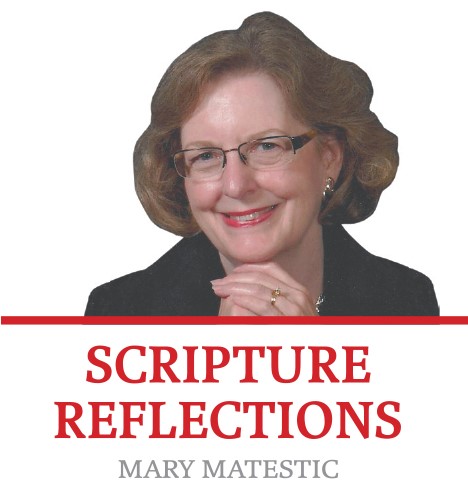Sixth Sunday of Easter
Acts of the Apostles 8:5-8, 14-17
First Letter of St. Peter 3:15-18
John 14:15-21
MARY MATESTIC
Sometimes I awake and think it is a normal day. I can get in the car, go to work, run errands, talk with friends sans mask, go to Mass, see our grandchildren or just go out for a simple supper. Opening the bedroom blinds peering at the budding trees, I am shaken back into the reality of COVID-19. It is a strange narrative we shall be telling our children years hence. Yet, there is hope.
When I was a child, the Baltimore Catechism was our “go-to” religious resource. There was one initial question that was well beyond our 6-year-old minds. Yet it formed us. The question was “Why did God make us?” The answer: “God made us to show forth his goodness and to share with us his everlasting happiness in heaven.” What I know now is this one liner became part of my meta-narrative. For in order to have hope in any life situation, we must have a meta-narrative. What is that? It is a narrative that we believe even beyond what is going on in and around our lives. It transcends chaos.
For example, when our troops are oversees in the soul-less horrors of war, they must have a story they believe in that gets them through. That might be a spouse and children who are loving them from afar and motivating them in troubled times. When a woman is in labor, battling the long hours of rhythmic breathing and pushing, she holds in her hopeful heart universal knowledge: the pain is temporary. Her child is forever.
I have worked with widows and widowers in the darkness of their grief; the meta-narrative that holds them together is faith. They know that one day they will be united with their loved one in heaven again.
What is so brilliant about the reading from the Final Discourse of Jesus in John’s Gospel, is that Jesus is creating a meta-narrative for his beloved apostles. It is the night before he will die and Jesus tells his apostles that he is going away and where he is going, they cannot come. He is letting them know that there will be trouble for them, but that in their steadfastness, God will send them a helper. John calls that helper a Paraclete, like a lawyer who is called upon in times of trouble. Jesus is preparing his friends for fierce and difficult work, for hard tasks. But he promises that after he dies, this Paraclete, who is the Holy Spirit, will guide them to know how to carry on the work of the Kingdom.
The stipulation for intimacy with the Spirit is love and obedience to God’s commandments. For John, love is everything. Love is the ground upon which God can do his greatest work. On the day of Christ’s triumph, those who have been obedient lovers will be assured a place on the breast of Jesus, like John. And, of course, love is dependent upon obedience. We can love God, but if we are not attentive to his leading and compliant with his bidding, love grows cold. Obedience comes from a Latin word, obedire, which mystics say means to listen dearly. For the more we understand God’s will, listening carefully to him, the more we will see and do the works of God.
Philip, one of the first deacons called to serve the Greek-speaking Jewish widows in Acts 6:5, has left Jerusalem because of the persecution there. He has moved to Samaria, where the people historically have been at odds with the Jews. But Philip, burning with the fire of the Holy Spirit and obedient to God’s call, proclaims Christ to the people of Samaria. So powerful are his words that God’s mighty arm heals through him. Demons take flight in Philip’s presence. There is joy in Samaria as they listen to Philip tell of Christ and his love for them.
They are of one mind and are baptized into the name of Jesus. The wonders of God are moving like fire and the meta-narrative found in the Paschal mystery becomes contagious. Impressed by the conversion of the Samaritan people, Peter and John (the pillars) come to lay hands upon the Samaritans so that the power of the Holy Spirit can come upon them as well. Now the Samaritans, too, become witnesses to Christ. The significance of this event shows that the Gospel is meant for all peoples. Philip becomes one of the architects of the early Christian Church.
In those mighty and humble beginnings, the Church grew.
That is why in the letter of Peter, we are told to always be ready to have our story, our meta-narrative, ready to tell people where our hope comes from. It needs to be kind. It needs to be reverent. When someone asks why I have hope, I always say: “I know Jesus lives, because he lives in me. I have experienced his love. I have heard his call.” I know the darkest dark will never overcome the Light of Christ.
So, I may not be able to leave my home. But I can pray here. I can listen to the voice of God direct my thoughts toward him. I can hold the people I love near to my heart, checking in on folks nearby. What I do know is that years ago, my meta-narrative began in that old retired catechism: “God made us to show forth his goodness and to share with us his everlasting happiness in heaven.” For me and for many, it became the fertile ground of hope.
